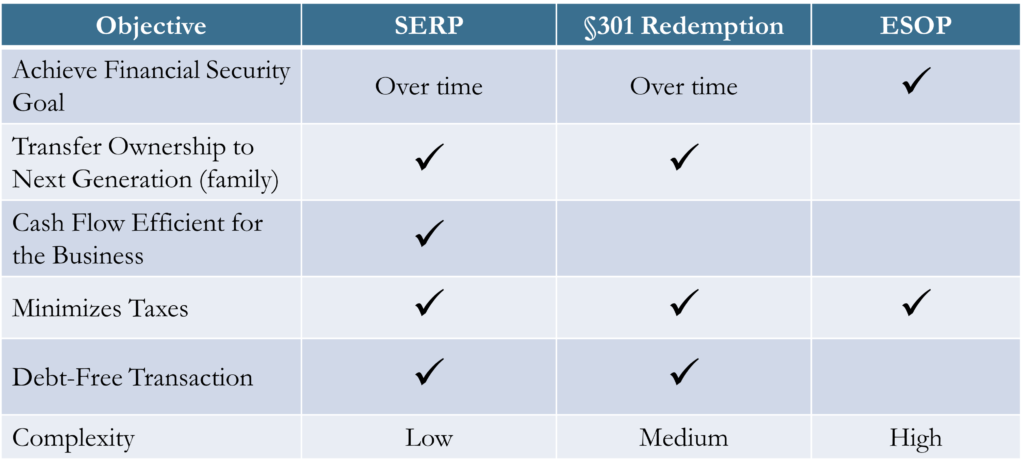All Roads Don’t Lead to a Third-Party Sale
Published: September 14, 2022
By Michael Kenneth
When most business-owners think about exiting their business, there is typically only one option they think of – selling to a third-party. Everyone hears the success stories of how a business sold for millions of dollars and the exiting owners were able to live out their retirement however they wanted. However, what most business-owners do not know is that a majority of businesses fail to monetize. The Exit Planning Institute estimates that over 75% of privately held businesses want to sell yet more than 70% of those never actually do. To put this into perspective, currently there is about $15 trillion of business value that is privately held in the US. Based on these percentages, that means over $7 trillion of this business value will not monetize!
Given the odds are against business-owners to actually monetize, what options exist for those who still want to exit their business? Fortunately, all succession plans do not have to lead to a third-party sale; the answer is there are plenty of strategies that should be considered.
If a third-party sale is off the table, there are a few other strategies that business-owners should consider for their eventual succession or exit. These strategies are summarized below:
- Employee Stock Ownership Plan (ESOP)
- An ESOP is a strategy where the business is purchased by the employees through the use of an Employee Stock Ownership Plan. An ESOP is an employee benefit plan that provides employees with an ownership interest in the form of company stock. There are substantial tax benefits that allow for more cash flow for either the selling shareholder or the business going forward. While this is a complex planning strategy, it can pay tremendous dividends for all parties involved. For more information on ESOPs, check out a recent presentation and webinar that we shared on our website.
- Leveraged Buyout
- This strategy involves the use of debt financing to help facilitate the purchase of the business. The debt involved in the purchase could come from a bank to provide a cash payment at closing or the purchase could be financed through a seller carry-back note (i.e. the exiting owner will be paid out over time). These leveraged buyouts can be flexible in terms of who the buyer is as well; depending on the situation, either the company or an existing or new shareholder may be the buyer. In any leveraged buyout, the buyer needs to be aware of the interest rate, term of the promissory note and any financial ratios/covenants associated with the debt.
- Supplemental Executive Retirement Plan (SERP)
- A SERP is a defined benefit plan that most companies use to compensate key leaders in retirement. Similar to a pension, it is effectively a “promise to pay” that involves a defined dollar amount, start date and length of the payments. SERPs can be an effective tool for succession planning too. A SERP liability can be over a long-term time horizon which can increase the company’s cash flow flexibility. In addition, the liability for these future payments can lower the value the business.
- Stock Redemption Plan
- In a redemption plan, a company can purchase the shares from the exiting shareholder over time. By following specific sections of §301 and §302 of the Tax Code, this purchase can take place and mitigate all taxes owed on the transaction. Feel free to reach out to one of our qualified BAS Partners to discuss this specific strategy.
- Gift
- If it is a family business, ownership could be transitioned to the next generation via a gift. While this does not result in a financial windfall for the exiting shareholder, it can ensure multi-generational ownership within the family’s bloodline. Gifts of business interests can yield substantial benefits from an estate planning perspective too. Please note that gifts of company stock should not be made to employees; that generates a taxable event and could have an adverse effect on the overall plan design.
The strategies mentioned above are just a sampling of the different strategies that a business should consider instead of a third-party sale. In some situations, a hybrid approach combining two or more of these strategies may produce the best result. What is most important is to align these strategies to the macro-goals of the stakeholder group. We have included an example of a macro-goal matrix below; this can be utilized to evaluate the various strategies and ensure the stakeholder group is making the right planning decision.

Keep in mind, the strategies listed above will not be applicable nor relevant to every business. Each company is unique in terms of its long-term vision, employees and financial strength to carry out the exit strategy. Prior to evaluating these strategies, it is important to make planning-based decisions based on the objectives of ownership and the leadership team. Only by performing quality due diligence, discovery and financial analysis can a company be in position to choose the right exit strategy for them.
There are a multitude of options to consider if a third-party sale is not your desired outcome for your business. So, don’t fret if you don’t want to sell your business to a competitor or private equity; evaluate all of your options and make the best choice that’s right for you!
###

